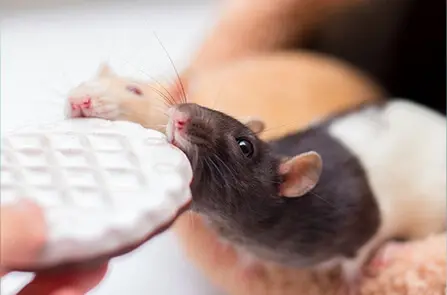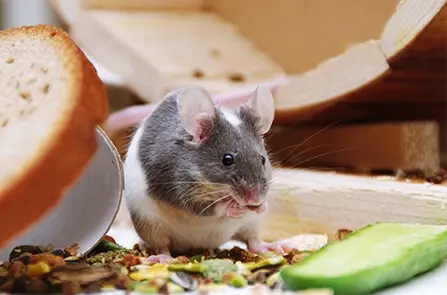Eliminating Worries: A Guide To Mus Musculus Health And Care

Is your little fellow not feeling well? Sometimes, these little creatures face health issues due to an improper environment and lack of proper nutrition and care. This comprehensive guide will help you ensure your little companion’s longevity and well-being.
Mus Musculus are little rodents present worldwide. Because of their unique appearance and various species and colors, they became the center of attraction for pet enthusiasts. They are ubiquitous and, therefore, found in the wild and in the human environment. Beside the fact that these little creatures are hefty and strong, they need proper care and attention to grow. Ensuring their health and well-being helps to enhance their longevity. Let’s move forward and understand the factors essential for their wellness.
Understanding The Health And Care Of House Mouse
The intelligent nature, attractive appearance, and highly social behavior of these little mice have made them popular among pet enthusiasts. Ensure the Mus Musculus’s health and care by properly caring for and handling them safely.
Socialization:
These little creatures are highly social pets that grow in the company of each other. Keep them happy by keeping them in groups. Observe their behavior before saving them in groups. Sometimes, the male mouse shows aggression when the same gender is placed in the cage. Avoid any mishap by experimenting with it beforehand.
Environment:
House mice are curious creatures and love to explore; therefore, providing them with a wide cage and ample space for roaming and exploration is essential. Keep the cage clean and ensure ventilation; it will reduce the chances of bacteria and ammonia. Protect them from overheating and ensure the availability of clean water.
Nutrition:
Fulfilling their nutritious needs is essential for a happier and longer life. These pets’ well-balanced diets include fruits, hay, vegetables, and commercial rodent pellets. Those living in the wild are omnivorous and eat whatever they find. Protect their health by avoiding fatty or sugary food products.
Enrichment:
Enrich your little companion’s life by allowing them to express normal behavior. They love foraging, digging, exploring, and burrowing. Therefore, please provide them with an environment where they can show these natural behaviors.
Some Common Diseases That Mouse Can Carry
Ensuring the Mus Musculus’s health and care is essential because they are prone to serious diseases if their well-being is taken for granted. Below are some health issues these mice can experience.
1. Hantavirus Leptospirosis (bacterial infection)
This infection is not limited to house mice but can be found in almost every rodent. The droppings, urine, and bite of these mice are the cause of the transmission of this disease.This disease is transmissible and can affect other rodents and even humans. Contrarily, Leptospirosis is a bacterial infection commonly found in the Mus Musculus.Its symptoms include mild flu that in its severe condition could cause damage to kidneys and liver of these rodents. The symptoms of these diseases include:
- Muscle Ache
- Fatigue
- Fever
- Respiratory issues
- Mild Flu

2. Lymphocytic choriomeningitis (viral infection)
It is an infection caused by a virus that shows signs such as nausea, fever, muscle ache, and headache. It is also spread by mouse urine and droppings. It is advised to protect your little fellow from these viral or bacterial diseases by ensuring hygiene, ventilation, and practice cautions. Take them to a veterinary consultant if your little companion shows such signs.
3. Plague (bacterial infection)
Ensure the Mus Musculus health and care by protecting them from the bacteria Yersinia Pestis. This bacteria causes plague in these little pets. High fever, swollen lymph nodes, chills, and pneumonia are some signs of this disease. It is advised to take your little fellow to the veterinary expert to protect their lives.
4. Typhoid (bacterial infection)
There are rare cases of typhoid in these house mice. These little pets are susceptible to Salmonella Typhi. This bacteria causes fever not only in rodents but also in humans. Even the mouse was taken as a research model to study typhoid in humans. As soon as you observe the symptoms of fever, diarrhea, and abdominal pain take them to the veterinary consultant. Proper medication will be helpful for such a disease.
Essential Preventive Measures
Some important measures for Mus Musculus health and care are listed below:
- Clean their cage regularly, and ensure ventilation & hygiene.
- Provide them with adequate drinking water.
- Give them fresh food in limited quantities to fulfill their nutritious requirements.
- Implementing flea control measures will help prevent bacterial or viral disease spread.
- Please provide them with enough space for exploration and roaming.
- Give them chewy toys to protect them from teeth-related issues such as overgrowth or malocclusion.
- Take them to the veterinary expert when you notice these symptoms in your little companion.
Conclusion!
Keeping these little creatures as your pets is relatively easy because they are inconspicuous. It is recommended that you provide them with a safer environment, fulfill their nutritional requirements, and allow them to socialize. Beside this proper care and attention protect them from carrying bacterial or infectious diseases such as typhoid, plague, and lymphocytic choriomeningitis. These little pets are prone to health issues therefore it is essential to make sure the environment in which they are living is favorable, and they are eating healthy food. Ensure Mus Musculus health and care by taking the preventive measures given in this blog.
Frequently Asked Questions?
Baby mice, also known as mouse pinkies, mainly depend on their mother’s milk for the first few weeks after birth.
Although they need natural daylight to thrive, it is recommended that they be kept away from direct sunlight.
Take care of your Musculus by fulfilling their dietary needs, providing a safer & hygienic environment, access to clean water, ample space to roam, and socialization.
To care for a baby, ensure ventilation, regular feeding, and safer environmental practices.





